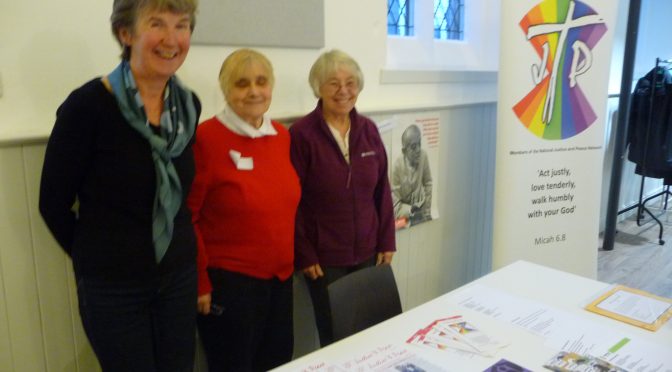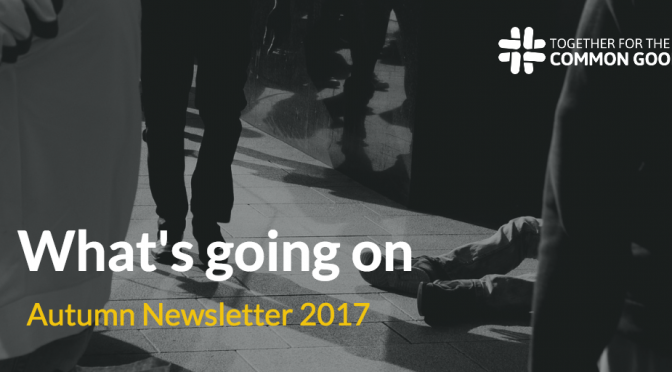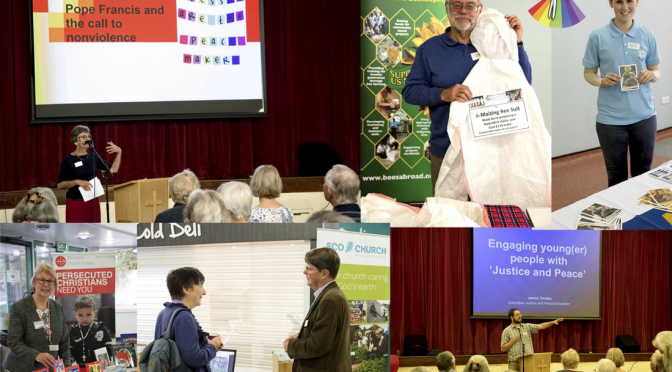
Portsmouth Diocese Justice Peace and Social Responsibility December 2017 Bulletin
Advent: The Coming of Good news The spirit of the Lord GOD is upon me, because the LORD has anointed me; he has sent me to bring glad tidings to the poor, to heal the broken-hearted, to proclaim liberty to the captives and release to the prisoners…. I rejoice heartily in the LORD, in my God is the joy of my soul; for he has clothed me with a robe of salvation and wrapped me in a mantle of justice… the Lord GOD make justice and praise spring up before all the nations. Isaiah 61
Download bulletin here;

Cardiff: World day of the Poor
On 19th November, five members of the Cardiff Justice & Peace Network took part in an event to mark the World Day of the Poor at the newly renovated Cornerstone building in Cardiff. The Network promoted issues that relate to poverty with a display of flyers and posters, while one member ran a FairTrade Stall and another gave a presentation on how poverty affects the elderly. Other groups present were the Rainbow of Hope which takes out food for rough sleepers at night and runs a drop in centre, and Sister Ruth O’Neil’s drop in centre and work with refugees and asylum seekers.

T4 CG: Latest News Autumn 2017
Despite the efforts of its powerful advocates, the current model of liberal democracy is in trouble. The ‘anti-politics’ trends sweeping across the West show a deep loss of trust in the capability of government to deliver prosperity and security for all. Divisions long in the making are now in sharp relief: not only between rich and poor, but also between metropolitans and traditional communities, old and young, progressives and social conservatives.
The culture of individualism has taken hold to such an extent that it is now unravelling the ties that bind us together. Its insistence on individual rights and on measuring people’s worth in financial terms pits us against each other and produces a disregard for mutual responsibility. Power has been over-centralised and too many communities have been left behind.
Read more here

Next week’s Budget must improve living standards for struggling families
A new report from The Joseph Rowntree Foundation with Loughborough University ‘Households Below a Minimum Income Standard 2008/9 – 2015/16,’ finds that almost 19 million people in the UK have less than they need for an acceptable standard of living, as defined by the public.
New analysis also shows how the public policy decisions of recent years mean more money in the pockets of some families, while others are hit hard.
Read the research here:
WCC Executive Committee emphasize peace, justice and unity
Photo: Jerusalem Patriarchate
19 November 2017
Speakers opening the World Council of Churches (WCC) executive committee meeting in Amman, Jordan from 17-23 November, emphasized peace, justice and unity as the WCC discerns its way forward and evaluates its past work.
The Patriarch of the Holy City of Jerusalem, All Palestine and Jordan, Theophilos III, welcomed the group: “We welcome you to Amman in the Hashemite Kingdom of Jordan under the leadership of His Majesty King Abdullah II, and we bring you the blessings of the Holy City of Jerusalem.” He added “ We are delighted to be able to host this meeting of your Executive Committee, and we wish to express our continued commitment to the work of the World Council of Churches.”
The Patriarch underlined in his opening address: “ You come to the Middle East at a difficult time for our region. The world community is united in the view that a vital, vibrant Christian community is an essential part of the multi-ethnic, multi-cultural, and multi-religious landscape of the Middle East. We are indigenous to this region.”
The Patriarch concluded: “We hope very much that our World Council of Churches will continue in its mission in the Middle East to secure the position of the Christian Community against the new threats to our existence and freedom.”
A pilgrimage graced by faith
WCC central committee moderator Dr Agnes Abuom said that most WCC programmes and visits have engaged the pilgrimage of justice and peace, which WCC committed as a foundation for its work at the 10th Assembly in Busan, Republic of Korea in 2013.
“Our pilgrimage of justice and peace has been graced by faith,” she said. “We began the journey together not knowing everyone. But we took a bold step to move together. We now know each other.”
By taking cautious steps together, she added, the WCC fellowship can now raise questions to and with one another, sometimes not comfortable questions. “But at least we feel that on the journey we have come to a stage where we can raise these questions,” she said. “Our journey together has centered around issues of love, care, humanity, and God’s creation.”
The executive committee will need to review its own performance, Abuom concluded. “ What we are leaving for the generations to come?” She added “As disciples of our Lord Jesus Christ, he will guide us in our reflections and decision. We can ask God to give us wisdom to journey into the future with courage so that tomorrow we can give an account to our Lord and Saviour and to those who have entrusted his mandate to us.”
A quest for unity
WCC general secretary Rev. Dr Olav Fykse Tveit, in his report, emphasized a quest for unity within the WCC’s work, particularly as it relates to justice and peace across the world.
“We are gathered here in a peaceful and hospitable setting, in a region of many conflicts and challenges,” said Tveit. “We are here to learn more about the realities of those challenges, but also to learn more about the rich traditions, the Christian presence and witness here, and the initiatives to live together in justice and peace for all.”
As the WCC moves towards through the mid-term between its 10th and the 11th assemblies, we live in a world where the dividing and fragmenting powers are strong, reflected Tveit. “The approach we have as WCC to be together on a Pilgrimage of Justice and Peace has proved its relevance,” he said. “As we prepare for the 70th anniversary we are in a modus of thanksgiving and proving how this body is alive, moving and taking new initiatives for the sake of the unity of Christians and the churches in the world.”
Tveit emphasized a new quest for unity, and among his personal experiences was a two-week visit to WCC’s churches and partners in the Pacific region. “In the different encounters with them, I was reminded how the WCC represents the Christian family in the whole world, and how our member churches make significant contributions to this understanding of being united as humanity, as creation and as sisters and brothers in Christ,” he said. “The hurricanes and the extreme weather including drought, rain, and wind in many parts of the world have made many more around the world feeling themselves what the peoples from the Pacific have talked about for a while.”
Visits to the Pacific region as well as to various sites observing the 500th anniversary of the Reformation had an impact on the WCC’s mutual relationships in a short and a long-term perspective, reflected Tveit. “We restored the sense of contact and attention and we shared ideas for the future mutual involvement,” he said.
Unity is a key issue for the Pilgrimage of Justice and Peace in Africa and for the preparations of the Conference on World Mission and Evangelism in Tanzania next year, continued Tveit. “The call to unity for the nations is much stronger when the churches also find their own credible expressions of unity,” he said.
The WCC has paid particular attention to the situation in Palestine and Israel, and the injustices, conflicts and occupation that still are obstacles to a just peace for both the Palestinians and the Israelis. “The call to just peace is as urgent and significant as before, if not even more,” Tveit concluded.
The World Council of Churches (WCC) executive committee will meet in Amman, Jordan from 17-23 November to approve the 2018 plans and budget, prepare for renewal of the WCC strategic plan, to discern the way forward for the WCC’s involvement in Palestine and Israel for justice and peace by learning more about the particular situation in Jordan and the Middle East, then discussing the challenges of the churches and the WCC response.
Media contacts:
Please contact WCC director of communication Marianne Ejdersten: mej@wcc-coe.org, +41 79 507 63 63
Read the Report of the General Secretary of the World Council of Churches, 17 November, 2017
Address by H B Patriarch Theophilous of Jerusalem
WCC Executive Committee to convene in Amman, WCC press release 16 November, 2017
WCC member churches in Jordan

Birmingham Justice and Peace Commission Newsletter
The latest edition of the Justice and Peace Commission Newsletter is now available to download here:
Latest news from Birmingham Justice and Peace Commission

Call for a Strategy to Support Vulnerable Groups in a Changing World
CARJ Press Release:
At its AGM on Saturday, the Catholic Association for Racial Justice (CARJ) called for a strategy that will promote justice, equality and community for the different vulnerable groups that are emerging in our changing world.
Speakers on the day highlighted:
- Young people in marginalised communities struggling to achieve their full potential
- Migrants, Refugees and Victims of Trafficking
- Gypsy Roma and Traveller Communities with inadequate Site Provision
- Families in de-industrialised areas who feel ‘left behind’
- Victims of caste discrimination in the UK
The ensuing discussion also mentioned: EU Citizens in the light of Brexit, Muslim communities and those individuals and groups who may be targets of radicalisation,,BAME groups in the criminal justice system and victims of hate crime.
The call for a wide ranging strategy is prompted in part by the Government’s recent publication of the Race Disparity Audit. Initial findings from the Audit show a changing, complex and many sided pattern of diversity and inequality:
The UK has become more ethnically diverse. The majority of people in each group feel at home. However, ethnic minorities tend to be poorer and different groups suffer disadvantage in different areas – eg. education, housing, criminal justice and health. At the same time, in education white working class boys are seriously under-achieving and in some places (eg de-industrialised areas) white communities suffer particular disadvantage and feel ‘left behind’.
CARJ hopes to work with others to develop a multi-faceted strategy to promote justice, equality and community among and between these various marginalised groups.
For further information contact:
CARJ, 9 Henry Rd, London N4 2LH, 020 8802 8080, info@carj.org.uk The Catholic Association for Racial Justice (CARJ) is an independent Charity dedicated to working with others for a more just, more equal, more cooperative society.

End Hunger UK Conference Report
The End Hunger UK campaign took a big leap forward on 17 October, when activists and experts gathered to share stories, ideas and expertise. End Hunger UK Press Officer Gavin Aitchison writes about what happened on the day.
Over the past year, campaign members have been building support and honing policy proposals, working with community groups, charities, academics and politicians. On 17 October, at a conference in Central Hall in Westminster, around 150 people from around the UK gathered for a series of workshops and discussions, and most signed pledge cards before they left, vowing to rally groups where they live. The event also saw the release of a draft menu for change, setting out 10 ideas for Government action.
Josh Fenton-Glynn, End Hunger UK campaign manager, said: “The conference was a very powerful event. We heard some harrowing stories of hunger from around the UK, but also some fantastic ideas for how we can end hunger. There is a clear groundswell of support now for Government action – not only from within charities and political circles, but across the country. We can end hunger in the UK, but we need supporters up and down the country to help, by getting involved with the campaign and by working with their local MP and community campaigners.”
Read about the highlights here.

*** NJPN Action of the Week *** End Hunger UK: Get your church or group to take the pledge
Are you involved in a group or project that works to tackle hunger and food poverty? It might be your church, a food bank, a house group, a Women’s Institute group, a community centre, or any other group working for food justice.
If so, we’d like you to ask your group to make a public pledge in support of End Hunger UK. It’s a way for you to show your support for the principles of End Hunger UK: the belief that no one should go to bed hungry at night, and that it’s time the Government stepped up to the plate and played its part in helping to End Hunger in the UK.
click here to make the pledge online !
A Day of Action for the Children of Calais
On October 24th it will be one year since the Calais ‘Jungle’ was demolished and thousands of refugees were displaced.
At that time, thanks to pressure from people like you, the Government successfully transferred 750 child refugees from France to Britain. We need to keep the pressure up, and repeat this success.
That’s why, on Tuesday 24th October, we will gather outside parliament with our partners Safe Passage, refugees who have been brought to the UK from the Calais ‘Jungle’, and Lord Alf Dubs. We will all be calling for more to be done to make sure no child is sleeping rough in Calais this Christmas.
Click here to be a part of it!










